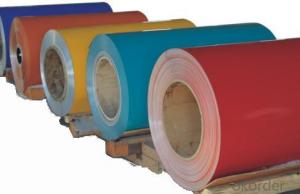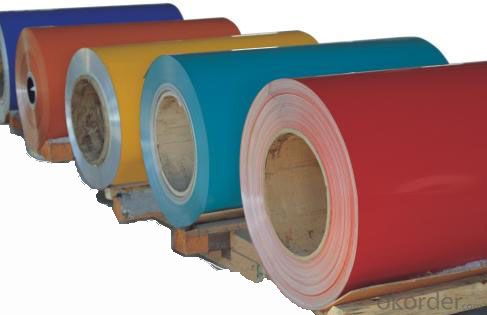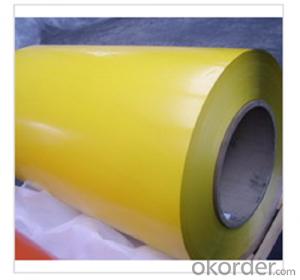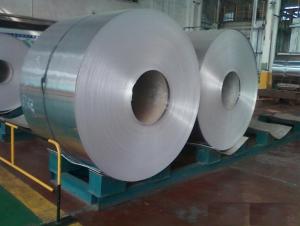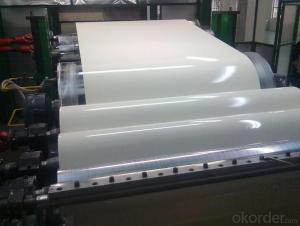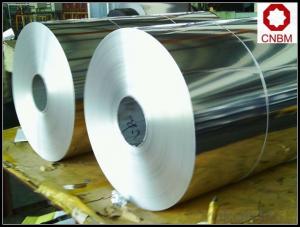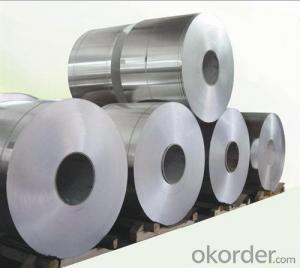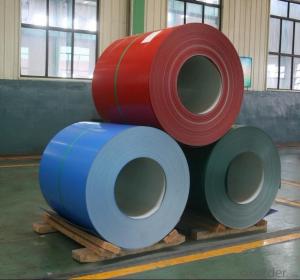Bronze Aluminum Coil Stock for Color Coated Coils in Aluminium Composition Panel
- Loading Port:
- Shanghai
- Payment Terms:
- TT or LC
- Min Order Qty:
- 5 m.t.
- Supply Capability:
- 1000 m.t./month
OKorder Service Pledge
OKorder Financial Service
You Might Also Like
1.Structure of Color Coated Coils for Aluminium Composition Panel
Color Coated Coils for Aluminium Composition Panel are of a wide range of colors, which give wonderful appearance no matter in residential and commercial constructions or great exhibition centers.Aluminum coils color coated have been widely used in the fields of construction and decoration, electronic applications, lighting decoration, air-condition air pipes, sandwich panels and drainages etc.
2.Main Features of Color Coated Coils for Aluminium Composition Panel
• Superior quality of raw material
• Reasonable and stable chemical composition
• Accurate tolerance
• Goode mechanical property
3.Color Coated Coils for Aluminium Composition Panel Images
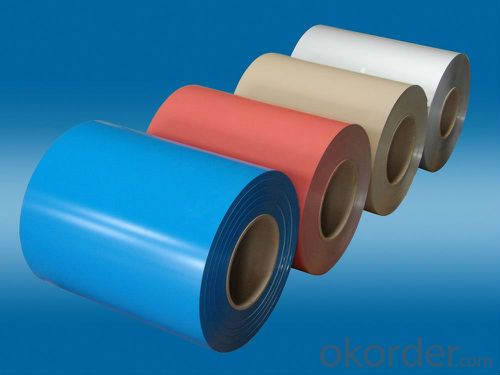
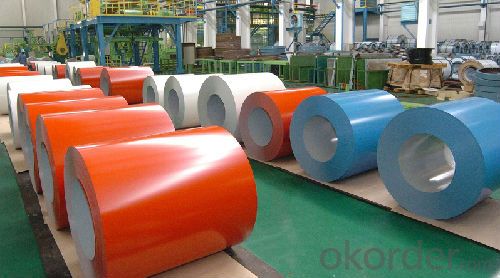
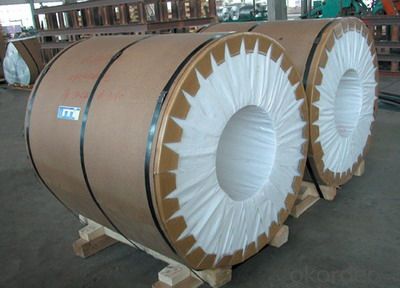
4.Color Coated Coils for Aluminium Composition PanelSpecification
| Alloy | AA1xxx,AA3xxx,AA5xxx |
| Temper | H14,H16,H18,H22,H24,H26,H32,O/F |
| Thickness | 0.03mm-3.0mm |
| Width | 30mm-1700mm |
| Coating | PE,PVDF,Epoxy |
| Painting Thickness | Standard 16-25 Mic, max 40 Mic |
| Color | According to RAL colors or customers' samples |
| Standard | GB/T 17748-1999 |
5. FAQ of Color Coated Coils for Aluminium Composition Panel
A.How to guarantee the quality?
Customers are welcome to our mill to visit and check the products. Besides, we can arrange a third party to test theAluminum Coils Colored Coated products.
B.When will you deliver the products?
The Aluminum Coils Colored Coated will be delivered within 35 days after receiving advanced payment or original L/C.
- Q: Can we provide raw materials, aluminium coils and aluminum panels for several integrated ceilings?
- You go to my space, add my QQ bar, I do aluminum, aluminum coil, aluminum wafer, and I also want to know about the requirements of integrated ceiling ~ ha ha!
- Q: Are there any limitations to the coil weight of aluminum coils?
- Yes, there are limitations to the coil weight of aluminum coils. The coil weight of aluminum coils is primarily limited by the capacity of the equipment used for handling and transporting the coils. Different machinery and materials handling systems have different weight capacities, and exceeding these capacities can lead to safety hazards and damage to the equipment. Additionally, the size and dimensions of the coils can also impact the maximum weight limit. Larger coils tend to have a higher weight limit, as they have a larger surface area to distribute the load. However, there is a practical limit to the weight that can be carried by the machinery and equipment, regardless of the coil size. Moreover, the strength and integrity of the material being used also play a role in determining the coil weight limit. Aluminum is a lightweight material with a high strength-to-weight ratio, which allows for larger coil weights compared to other materials. However, extreme weight can cause deformation or damage to the coil, affecting its quality and usability. It is important to consider these limitations and adhere to the manufacturer's recommendations and industry standards when determining the maximum coil weight. Proper handling, storage, and transportation procedures should be followed to ensure the safety of personnel and the integrity of the aluminum coils.
- Q: How do aluminum coils contribute to energy-efficient lighting?
- Aluminum coils contribute to energy-efficient lighting by serving as the primary material for heat sinks in LED light bulbs. These heat sinks are essential in dissipating the excess heat generated by the LED chips, thereby preventing overheating and ensuring optimal performance, longevity, and efficiency of the lighting system.
- Q: What is an aluminum coil?
- An aluminum coil is a long, flat, and thin piece of aluminum that is typically wound into a spiral shape. It is commonly used in various industries, such as construction, automotive, and electrical, due to its excellent corrosion resistance, lightweight nature, and high conductivity. Aluminum coils are often used for manufacturing products like gutters, roofing materials, heat exchangers, and electrical components.
- Q: What is the typical warranty period for aluminum coils?
- The typical warranty period for aluminum coils can vary depending on the manufacturer and the specific product. However, in general, aluminum coils tend to have warranty periods ranging from 5 to 10 years. This means that during this time, the manufacturer will cover any defects or issues that may arise with the aluminum coils. It is important to note that some manufacturers may offer extended warranty options for an additional cost. Additionally, it is advisable to check the warranty terms and conditions provided by the manufacturer as they may have specific requirements or limitations for the warranty to be valid.
- Q: This question asks for methods to assess the quality of aluminum coils, which is important for various industries that use aluminum for manufacturing and construction.
- <p>To check the quality of aluminum coils, you should inspect for surface defects such as scratches, dents, or discoloration. Measure the thickness and width to ensure they meet specifications. Test the hardness and tensile strength to verify mechanical properties. Conduct a chemical analysis to confirm the alloy composition. Check for internal defects using non-destructive testing methods like ultrasonic testing. Assess the coil's flatness and straightness to prevent issues in further processing. Finally, ensure proper packaging and storage conditions to maintain coil quality.</p>
- Q: How are aluminum coils inspected for quality control?
- Aluminum coils are inspected for quality control through a combination of visual inspections and various non-destructive testing methods. These measures ensure that the coils meet the required specifications and are free from any defects or flaws. Visual inspections involve trained personnel carefully examining the coils for surface defects such as scratches, dents, or any irregularities in shape or size. The inspectors also check for any signs of contamination, oxidation, or discoloration. Any abnormalities detected during this visual inspection are noted and addressed accordingly. In addition to visual inspections, non-destructive testing techniques are employed to evaluate the internal quality of the aluminum coils. One commonly used method is ultrasonic testing, where high-frequency sound waves are transmitted through the coils. The reflected sound waves are analyzed to identify any internal defects like voids, cracks, or delaminations. This technique allows for a thorough assessment of the coil's integrity without causing any damage to the material. Another non-destructive testing method used for quality control is eddy current testing. This technique involves inducing electrical currents in the coils and measuring the resulting magnetic fields. Any variations in the magnetic fields can indicate flaws or defects in the aluminum, such as cracks or inclusions. Eddy current testing is particularly effective in detecting surface defects and discontinuities. Furthermore, measurements of important physical properties like thickness, width, and flatness are taken to ensure they meet the required standards. This is typically done using specialized instruments such as micrometers, calipers, or laser scanners. Overall, the inspection of aluminum coils for quality control involves a combination of visual inspections and non-destructive testing techniques to ensure that the coils are free from defects, meet the required specifications, and are of high quality.
- Q: Are aluminum coils fire-resistant?
- Yes, aluminum coils are fire-resistant.
- Q: Can aluminum coils be used in the aerospace industry?
- Yes, aluminum coils can be used in the aerospace industry. Aluminum is widely used in the aerospace industry due to its desirable properties such as low density, high strength-to-weight ratio, and excellent corrosion resistance. Aluminum coils are often used in the manufacturing of various aircraft components such as fuselage panels, wings, and structural frameworks. The coils can be easily formed into different shapes and sizes, providing flexibility in design and reducing the overall weight of the aircraft. Additionally, aluminum coils are compatible with different manufacturing processes like welding, machining, and forming, making them an ideal choice for the aerospace industry.
- Q: What are the density and specific gravity values of aluminum coils?
- Aluminum coils have a density of around 2.7 grams per cubic centimeter (g/cm³) or 2700 kilograms per cubic meter (kg/m³). The specific gravity of aluminum coils is roughly 2.7.
Send your message to us
Bronze Aluminum Coil Stock for Color Coated Coils in Aluminium Composition Panel
- Loading Port:
- Shanghai
- Payment Terms:
- TT or LC
- Min Order Qty:
- 5 m.t.
- Supply Capability:
- 1000 m.t./month
OKorder Service Pledge
OKorder Financial Service
Similar products
Hot products
Hot Searches
Related keywords
